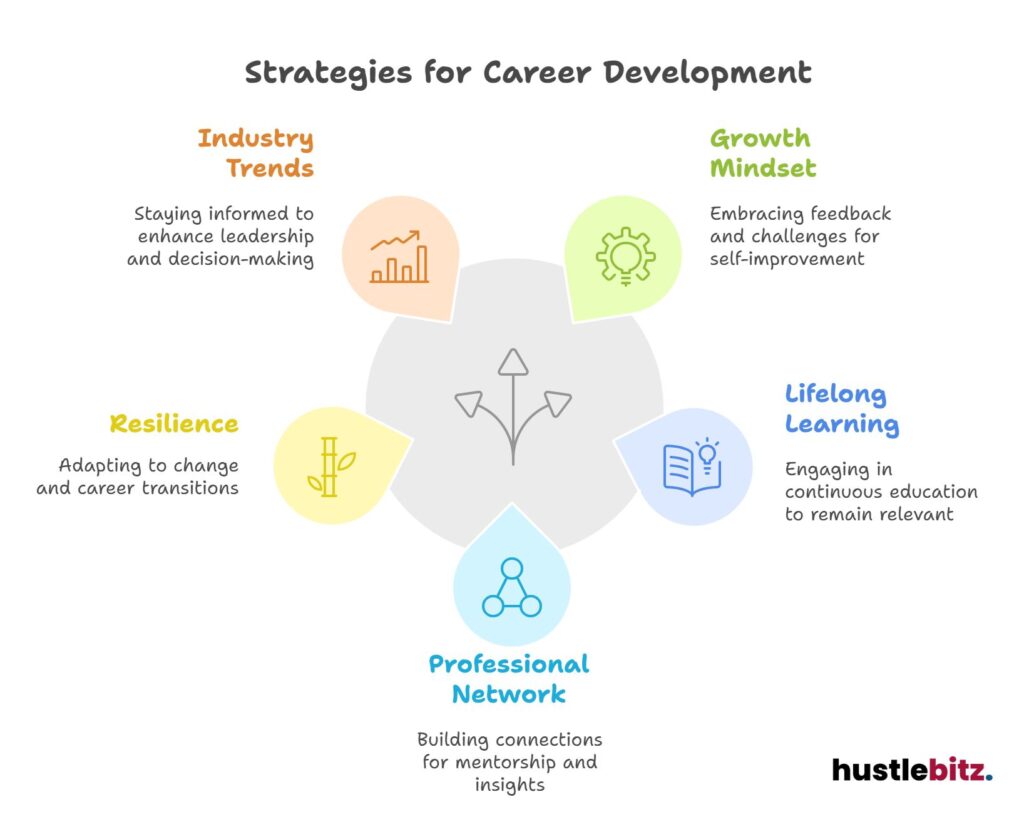Building skills for career growth is crucial for long-term success. Start by cultivating a growth mindset and resilience to embrace challenges and learn from setbacks. Engage in lifelong learning through workshops and online courses to stay relevant. Networking plays a significant role in expanding your professional reach and accessing mentorship opportunities. Additionally, staying informed about industry trends will help you adapt and position yourself as a leader. Lastly, be open to navigating career transitions by leveraging transferable skills. Each of these strategies contributes to your professional development and prepares you for new opportunities ahead. Explore further insights to enhance your journey.
Key Takeaways
- Cultivate a growth mindset to embrace feedback and view challenges as opportunities for self-improvement.
- Engage in lifelong learning through workshops, online courses, and industry conferences to stay relevant.
- Build a strong professional network to access mentorship, collaboration, and industry insights.
- Develop resilience to adapt to career transitions and embrace change proactively.
- Stay informed about industry trends to position yourself as a leader and enhance decision-making capabilities.

1. Building a Growth Mindset:

Building a growth mindset is essential for navigating the challenges of career advancement and fostering continuous personal and professional development. A growth mindset encourages individuals to view obstacles as opportunities for growth, which is vital in today’s dynamic work environment. Resilience training can be a powerful tool in cultivating this mindset, enabling professionals to bounce back from setbacks while maintaining a focus on improvement.
Incorporating positive thinking into daily routines can also enhance resilience and foster a culture of continuous learning. By actively engaging in self-reflection practices, individuals can assess their strengths and weaknesses, allowing for strategic goal setting that aligns with personal and professional aspirations.
Embracing feedback is another critical aspect; constructive criticism can serve as a roadmap for improvement, guiding individuals to refine their skills and approach.
Visualization techniques can be particularly effective in manifesting goals. By picturing success and outlining the steps needed to achieve it, professionals can motivate themselves to take actionable steps forward.
Additionally, employing motivational strategies, such as affirmations and accountability partners, can reinforce commitment to personal growth.
2. Developing Essential Skills
Acquiring essential skills is crucial for career advancement, as it empowers professionals to adapt to changing demands and excel in their respective fields. A systematic approach to skill development begins with a thorough skill assessment, identifying areas that require improvement or enhancement. This analysis serves as a foundation for targeted goal setting, which is vital for structured progress.
Engaging in online courses can provide valuable technical proficiency, allowing individuals to stay updated with industry standards and practices.
Additionally, participating in mentorship programs can offer insights from experienced professionals, fostering personal and professional growth. These mentors often guide mentees through feedback loops, ensuring continuous improvement and adaptation.
Networking events present another opportunity to develop soft skills, such as effective communication and teamwork. These interactions not only expand one’s professional circle but also expose individuals to diverse perspectives and experiences, enriching their skill set.
Furthermore, practical experience in the form of internships, volunteer work, or project involvement can significantly enhance both soft and technical skills. Acquiring certifications in specific areas of expertise further validates one’s capabilities, making candidates more appealing to potential employers.
3. Expand Your Professional Reach

Regularly expanding your professional reach is essential for unlocking new opportunities and fostering meaningful connections within your industry. Implementing effective networking strategies can significantly enhance your visibility and credibility. Engaging in mentorship programs not only provides guidance but also opens doors to valuable connections with experienced professionals who can offer insights and referrals.
Participating in online communities related to your field allows for real-time discussions and knowledge sharing. These platforms facilitate skill sharing and help you stay connected with peers who share similar interests. Additionally, joining professional associations can provide access to resources and networking events designed to cultivate relationships with industry leaders.
Attending industry conferences and participating in virtual meetups are excellent avenues for meeting potential collaborators and expanding your network. These events often showcase collaborative projects that can lead to partnerships, enhancing your professional reach while also contributing to your personal branding efforts.
Being a part of cross-functional teams allows you to interact with diverse professionals, broadening your skills and perspectives. These interactions can lead to new opportunities and foster innovation within your work.
Ultimately, by proactively engaging in these activities, you position yourself as a well-rounded candidate in your field. The connections you establish through these efforts can play a pivotal role in your career growth and open doors to new avenues for professional advancement.
4. Staying Ahead of Industry Trends
Staying informed about industry trends is crucial for professionals seeking to maintain a competitive edge and adapt to the ever-evolving landscape of their field. Conducting regular market analysis helps identify emerging trends and technology advancements that can significantly influence business strategies. By understanding the competitive landscape, professionals can leverage insights to refine their innovation strategies and align their skills with market demands.
Engaging in ongoing professional development is essential for staying relevant. Skill assessments can help individuals identify gaps in their knowledge and competencies, guiding targeted learning efforts. Participating in workshops and training programs enhances expertise, ensuring that professionals are equipped to meet future challenges.
Networking strategies play a pivotal role in remaining informed. Establishing connections with industry leaders and peers fosters the exchange of ideas and insights, providing access to invaluable thought leadership. By attending conferences, webinars, and industry events, professionals can gain firsthand knowledge of industry forecasts and trends.
Moreover, subscribing to industry publications and joining professional organizations can enhance awareness of current developments. This proactive approach allows individuals to anticipate changes and adapt accordingly.
5. Navigate Career Transitions

Navigating career transitions requires a strategic approach that encompasses self-assessment, skill development, and effective networking. A career change can be daunting, but by focusing on transferable skills and emotional intelligence, individuals can pivot successfully into new roles or industries.
Begin with a thorough skill assessment to identify strengths and areas for improvement. Utilize self-reflection techniques to evaluate past experiences and how they align with your career aspirations. This introspection lays the foundation for personal branding, which is essential in distinguishing oneself in a competitive job market.
Networking strategies play a pivotal role in career transitions. Engaging with industry professionals and joining relevant communities can open doors to mentorship opportunities and valuable insights into new fields. Building resilience is also crucial; the ability to adapt to challenges and setbacks can significantly enhance your transition experience.
The table below outlines key components to consider during career transitions:
| Component | Description | Action Steps |
| Skill Assessment | Evaluate current skills and identify gaps | Conduct self-assessments and seek feedback |
| Networking Strategies | Develop connections in target industries | Attend events and leverage social media |
| Mentorship Opportunities | Seek guidance from experienced professionals | Identify potential mentors and reach out |
| Personal Branding | Create a professional identity | Update resumes and online profiles |
Stay Adaptable and Open-minded

Embracing adaptability and open-mindedness is vital for professionals seeking to thrive in an ever-evolving job market. In today’s dynamic environment, flexible thinking allows individuals to navigate unexpected challenges and seize new opportunities. By embracing change, professionals cultivate an innovative mindset that fosters creative problem solving.
Lifelong learning is an essential component of staying adaptable. Engaging in continuous education through workshops, online courses, or industry conferences equips individuals with fresh insights and skills. Diverse experiences, whether through varied job roles or cross-functional projects, enhance one’s ability to approach problems from multiple perspectives. This breadth of experience not only demonstrates resilience but also enriches professional networks, leading to valuable networking opportunities.
Resilience training enables professionals to bounce back from setbacks, reinforcing their adaptability. Accepting feedback, both positive and constructive, is crucial for personal growth and self-improvement. Practicing self-reflection techniques helps individuals assess their strengths and areas for development, promoting a proactive approach to career advancement.
Ultimately, staying adaptable and open-minded is not just about reacting to change; it’s about anticipating it. By fostering a culture of adaptability, professionals position themselves as leaders in their fields, ready to tackle the complexities of the modern workplace. The ability to pivot, learn continuously, and embrace diverse perspectives will set individuals apart in their pursuit of career growth.
Final Thoughts
Building skills for career growth is an ongoing journey that requires dedication, adaptability, and a willingness to learn. By cultivating a growth mindset, staying informed about industry trends, and expanding your professional network, you can position yourself for long-term success. Embracing career transitions with resilience and a focus on transferable skills will open new doors and opportunities. Remember, continuous learning and adaptability are key to thriving in today’s dynamic job market. By applying these strategies, you can not only advance your career but also lead with confidence in any professional setting.




